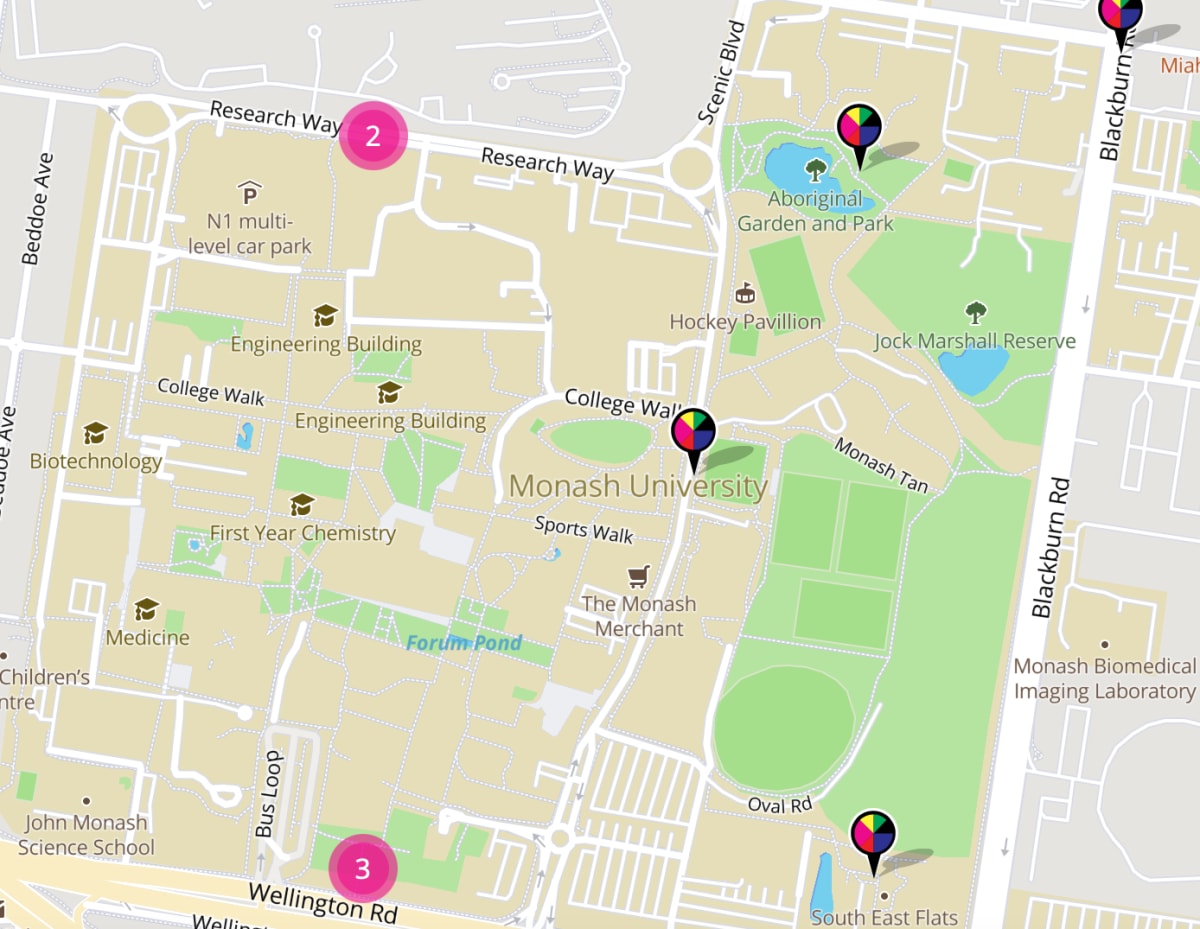BY JULIETTE CAPOMOLLA
A digital mapping service titled 'YourGround' provides an opportunity for people to pinpoint unsafe places across Victoria, in a bid to make them more inclusive - particularly for women and gender-diverse people.
YourGround is an initiative created by Monash University’s XYX Lab in partnership with CrowdSpot. It allows people to anonymously identify ‘Unsafe Spots’ and ‘Safe Spots’ in Victoria based on their lived experiences.
Pins, like those used in Google maps, are dropped onto areas designated safe or unsafe by YourGround users.
At the time of publication, Monash University’s Clayton campus had nine pins, eight of which were labelled as unsafe.

Places labelled in this manner shared common safety issues, including people reporting difficulty finding their way around, and no other people in the area.
However, the most common safety issue reported at Clayton campus was poor lighting.
The one ‘Safe Spot’ is pinned at Clayton’s Alexander Theatre, which was described as having good lighting, a safe pathway and clear exits and entrances.
Monash University’s Caulfield campus does not have any pins directly on the campus.
However, there are six pins located within a close radius, including at Caulfield Plaza, Caulfield train station and surrounding streets.
The university’s Peninsula campus has one pin at the Peninsula Hockey Centre, which has been marked as a ‘Safe Spot’.
XYX Lab Director Dr Nicole Kalms said any changes to the campus should be made “in consultation with women and gender-diverse people and experts in gender-based safety”.
“For instance, from other projects, we know that low lighting levels can exacerbate other physical environment design factors. Such as the possibility of places where people can hide, not just in the shadows, but behind walls or vegetation or around corners,” Dr Kalms said.
“The ability to see what is ahead and to the side is essential for a sense of safety as women move through the city,” she said.
“Auditing the appropriateness of lighting, particularly prioritising places considered ‘hot spots’, and engaging women and gender-diverse people in the process is important.”
However, the platform goes beyond pinpointing safety issues.
“We hope to empower women, girls, and gender-diverse people to call out and geographically identify safe and unsafe experiences and fight back against feeling afraid, unheard, or disempowered,” Dr Kalms said.
“The map unearths real stories of women, girls and gender-diverse people, and makes them visible to people in positions of power – like those in local and state government – to advocate for change.”
Metropolitan Melbourne has approximately 3000 pins and more than 500 spots have been tagged throughout regional Victoria, totalling more than total 5500 contributions, including support comments.
“Information is power, and women and gender-diverse people’s collective stories, when shared, have extraordinary impact,” Dr Kalms said.
“This can be a way for women and gender diverse people to feel that they are empowering us all.”
The platform was made as a research project, and is not intended to be used by women and gender-diverse people to change their behaviour or avoid certain areas.
“We hope the analysis of the spots and stories shared on YourGround will drive decision-makers to tackle the myriad factors that make the city unsafe, uncomfortable and hostile for women, girls and gender-diverse people,” Dr Kalms said.
A Monash University spokesperson said the university had “noted the specific Monash campus locations” flagged by YourGround, and would “address these in future planning and upgrades”.
Despite Monash having “invested in excess of $8 million over the past six years on campus safety and external lighting initiatives across all campuses”, according to the spokesperson, poor lighting remained one of the most common safety concerns on the YourGround digital platform.
“[Reviewing physical safety on campus] involves discussion and coordination with local councils regarding conditions leading to, and on the edge of our campuses," the Monash spokesperson said.
“The university has pedestrian lighting level standards in place that are outlined in the University’s Minimum Design and Construction Standards.”
People who placed pins on Monash’s Clayton campus reported feeling “paranoid” and not “safe walking back [to the car park] because it's dark”, despite these minimum standards being in place.
“The project will close shortly and the key findings will be invaluable to decision-makers across Monash campus planning and design,” the spokesperson said.
However, students and staff can report safety and security concerns to the university, as well as any feedback on planning and infrastructure at any time.
According to Dr Kalms, “at this stage, there are no plans to reopen the map after the July 31 closing date”.